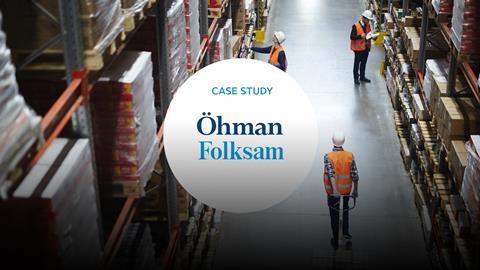Human rights case study
Öhman Fonder
- Signatory type: Investment Manager
- Asset class: Listed equity
- Operating region: Global
Folksam
- Signatory category: Asset owner
- Asset owner type: Insurer
- HQ region: Sweden
Öhman Fonder is Sweden’s largest independent asset manager. Öhman aims to deliver an attractive risk-adjusted return, and a crucial way to do that is by investing in companies that behave responsibly.
Folksam, one of Sweden’s largest insurance and pension providers, has led several global and local engagement campaigns and has integrated environmental, social and governance (ESG) aspects in all investment decisions for more than two decades.
Why we engage with companies on human rights
Öhman works to influence companies to improve their internal processes and external reporting on ESG issues. We are convinced that this work is needed to achieve long-term, stable financial returns. We believe that an economic system where companies and investors seek to minimise the negative and maximise the positive impact on people and the environment is essential to achieve long-term sustainable growth.
Folksam believes that responsible businesses, with a proactive approach to ESG issues, are better equipped to outperform companies that are less responsible. We expect our holdings to comply with the UN Guiding Principles on Business and Human Rights (UNGPs), as well as other international ESG standards.
Amazon is one of the world’s largest companies with over one million employees and a truly global presence. The company is therefore exposed to multiple human rights risks. But it also has an excellent opportunity to take a leading role. Its business practices and approach to human rights have the potential to make a significant impression outside the company and this would serve as an inspiration to others.
How we engage with companies on human rights
Öhman and Folksam conduct thorough ESG due diligence of all companies we invest in to ensure that we are aware of any potential environmental or social risk that is not properly addressed. We also monitor ESG-related news of companies in our portfolio to capture severe environmental or social incidents that have occurred. Our concerns regarding Amazon’s human rights performance, which we explore further below, came to light in this process, and we decided to start an engagement dialogue with the company.
Amazon’s rapid growth in recent years has been financially positive for its investors, however it has also exposed the company to a wide range of human rights issues. The company has been criticised for work environment issues[1] including above-average workplace accident rates[2], complaints from US lawmakers about working conditions at a New York warehouse[3] and being found by the US labor board to have illegally fired workers advocating for better working conditions[4]. In light of the above, we have engaged with Amazon on its human rights practices for a number of years.
In early 2020, we co-filed a shareholder proposal on human rights ahead of Amazon’s annual general meeting (AGM) . A few months after the shareholder proposal was announced, Amazon launched its new Global Human Rights Principles. Following the AGM, we participated in numerous engagement conversations with Amazon, aiming to encourage the company to speed up the implementation of the new policy.
Despite this, we received repeated information from ESG service providers as well as labour rights organisations alleging that Amazon was trying to prevent its employees from organising trade unions at one of its warehouses in Alabama, in violation of its own policies. This was demonstrated in numerous ways, including text messages sent to employees, specifically encouraging them to not organise themselves, and via the website “Do it Without Dues”[5].
Given the significant gap between Amazon’s human rights policy and the incidents referred to above, we decided to turn to the company’s board of directors. A letter was drafted, outlining Amazon’s urgent need to comply with its new policy[6]. The letter was co-signed by more than 80 investors globally, representing more than US$8 trillion in AUM, and the campaign was covered extensively in Nordic and international media, including the Financial Times[7].
Example: setting human rights-focused engagement objectives for Amazon
The long-term targets for engagement with Amazon can be divided into three different sub-targets:
- Encourage Amazon to develop a human rights policy, with references to the UNGPs and other relevant international standards.
- Encourage Amazon to publish a process for how the human rights policy should be implemented across the organisation and its entire value chain.
- Ensure Amazon complies with the policy, without any major incidents. This includes that Amazon reports actively on its human rights work.
By June 2021, the first sub-target was achieved as outlined previously, and we are seeing movement on the second one. Despite the company’s progress there is still a lot of work until we would consider its human rights standards satisfactory. We will therefore continue our engagement dialogue with Amazon, with a short-term focus on the implementation of the human rights policy.
When offered the chance to comment on this case study, Amazon stated that it responded to Folksam and Öhman Fonder in relation to the content discussed in the case study in February 2021. Amazon did not provide any additional comment to the PRI to be published alongside the case study itself.
References
[1] https://www.theguardian.com/technology/2020/feb/05/amazon-workers-protest-unsafe-grueling-conditions-warehouse
[2] https://www.bbc.co.uk/news/technology-57332390
[3] https://www.nysenate.gov/newsroom/in-the-news/michael-gianaris/politico-new-york-dozens-elected-officials-urge-amazon-improve
[4] https://www.reuters.com/business/retail-consumer/amazon-settles-with-employees-allegedly-fired-criticizing-working-conditions-2021-09-29/
[5] https://www.vice.com/en/article/5dpkad/amazon-launches-anti-union-website-to-derail-alabama-union-drive
[6] https://www.naturalinvestments.com/wp-content/uploads/2021/02/Ohman-Folksam-Letter-to-Amazon_210209-PUBLIC.pdf?x35441
[7] https://www.ft.com/content/c7f24fbb-bb4e-489e-8a30-37708700e816












